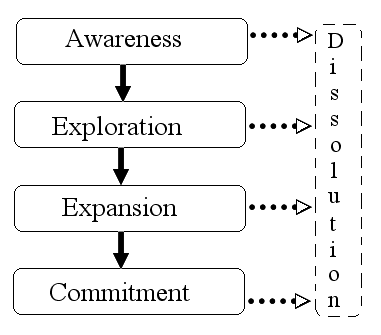| << Chapter < Page | Chapter >> Page > |

The awareness phase begins before any transactions actually occur. During this phase, partners are locating, identifying and qualifying various prospects. Since no transactions take place, company image and reputation are weighed heavily during this phase. Awareness means assessing the business relationships needed to advance organizational goals, evaluating potential areas that would benefit from a partnership, and identifying potential partners. Partnerships can have various types of relationships; some areas may only need to be functional, whereas others may seek to be strategic. Consequently, identifying which type of relationship would most benefit the firms is imperative and a primary responsibility of managers
The exploration phase is considered the test for both parties. During this phase, parties engage in exchanges to explore potential partnership costs and benefits. Although neither side has committed to a relationship at this point, each transaction between the two parties tests each of their capabilities. Managers evaluate the transactions in terms of the foundations of relationships discussed above, e.g. identifying potential measures that indicate successful transactions or estimating the impact on organizational culture should the relationship become established. After both parties prove that they are capable of performing as needed, the partnership will move to the expansion phase. In this phase, additional business interactions focused on a long-term relationship are investigated. The expansion phase may be time consuming because it requires extensive research to be conducted both internally and externally. The primary activity of this phase is comparing the results of a series of financial analyses of various possible interactions and relationship types.
A contract, or at least a verbal commitment, for a certain period of time must take place for the commitment phase to begin. This stage is usually the final and most complex stage of a strategic relationship. During this phase, the details of the transactions are decided, including initial investments that will be made into the partnership and specification of how returns will be divided among the partners. The dissolution phase is the decision to end the partnership. This may occur during any of the various phases of the relationship development process. Dissolution may arise for a number of reasons, including rising costs, poor performance, or changes in corporate goals. The decision to end the partnership should not be taken lightly, but when all other options have been exercised it may be the correct choice. While relationships will follow this development life cycle, a manager’s skills will substantially impact how the relationship develops and the success of the agreements for the organization. Training and development programs for managers should explicitly include skills for developing relationships.
Two key skills that promote positive relationships are negotiation and facilitation. Negotiation skills can assist with problem solving and conflict resolution with partner organizations. Facilitation skills deal with the understanding of group processes and feedback.
Negotiation skills are necessary for managers to ensure they understand the goals and tactics of others. Negotiation involves understanding goals and the impacts of the range of possible outcomes on an organization. Adept negotiators must be able to identify compromises such that both partners are supportive of the resulting agreements.
Facilitation involves listening to the views of all parties and ensuring that critical issues are heard, regardless of their origin. Active facilitation brings objectivity to group processes and results in shared understandings of potential opportunities and the costs of pursuing those opportunities. Technology can aid managers in facilitating group discussions and recording group interactions. In some situations, professional facilitation may be appropriate if either side has reached a point where reaching a mutual understanding is difficult.

Notification Switch
Would you like to follow the 'Business fundamentals' conversation and receive update notifications?